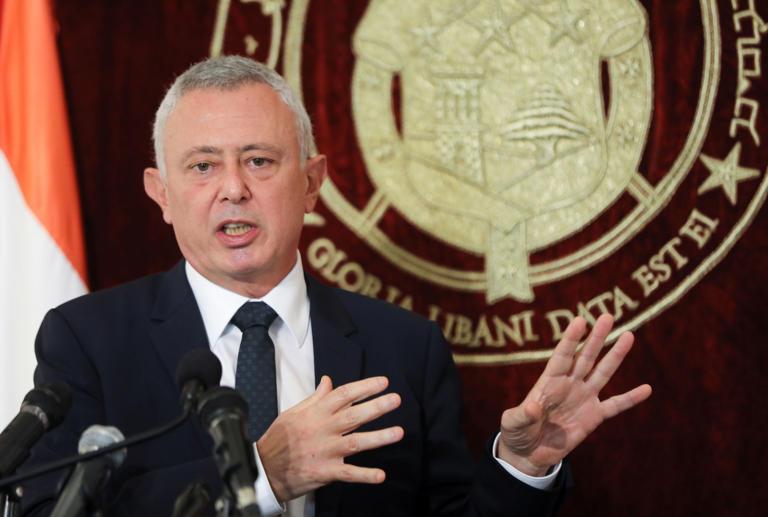
Why have Hezbollah and Amal chosen to back Suleiman Frangieh?
It was the “secret” that everyone knew in private, but — until recently — had not been publicly declared.
On Monday night, Hassan Nasrallah, the secretary general of the highly influential Lebanese political party and Iran-backed armed group Hezbollah, lifted the veil of secrecy when he formally declared his support for Suleiman Frangieh in Lebanon’s stuttering presidential race.
Hezbollah’s backing of Mr Frangieh, a 56-year-old Maronite Christian with close ties to Syria’s Bashar Al Assad, followed soon after Speaker Nabih Berri, head of Hezbollah’s Shiite ally the Amal Movement, voiced his support for him as well.
In 11 sessions spanning nearly six months in the 128-seat legislature, the Shiite duo has almost always cast blank ballots. That they are now supporting Mr Frangieh is hardly a surprise, but in public they had been vague — until now.
“You need an indication. Now Suleiman shows he is ready to run,” said a source close to the Amal parliamentary bloc.
Asked what characteristics Mr Frangieh had that made the bloc want to support him, the source said: “His experience with the Lebanese political life. He has history, he is respected, he has weight in the Christian community. He has good relations with all Christian communities. He has good relations with Arab countries.”
Lebanon has been without a president since the end of October, when Michel Aoun stepped down at the end of his term.
MPs have held 11 sessions thus far, but come nowhere near finding a successor to the ex-army chief.
Michel Moawad has received support from about a third of MPs, mainly from those deeply opposed to Hezbollah — including the parliament’s largest party, the Christian Lebanese Forces. But the number of MPs supporting him has stagnated and, if anything, begun to drop.
Mr Berri had been scheduling regular presidential sessions in the deeply divided parliament, where no bloc holds a majority, but stopped doing so in January because of the impasse.
In the first round of voting, a two-thirds majority — or 86 seats ― is required for a successor to be named. An absolute majority is needed in subsequent ballots in the same session — although so far they have been abandoned for a lack of quorum, as Hezbollah and its allies left the room.
Now there are indications that Mr Berri could be set to resume the sessions, as soon as there are a number of serious candidates on the table. The source close to Amal indicated this could be as soon as next week, so long as Mr Frangieh formally declares his interest in the presidency.
Still, observers and opponents of Mr Frangieh feel like the timing of Hezbollah and Amal’s support is not a coincidence.
At recent talks in Paris between major powers interested in Lebanon, there were reports that Saudi Arabia had shown reservations over Mr Frangieh’s candidacy.
Hezbollah’s man
“It was an open secret. We knew for a long time that Suleiman Frangieh was Hezbollah’s leading candidate,” said Karim Bitar, professor of international relations at Saint Joseph University of Beirut.
“Hezbollah is sending a signal to the local stakeholders, as well as to the regional powers, that Suleiman Frangieh is officially our candidate. At this stage we do not have a plan B.”
The reality is, however, that while the Shiite duo’s support for Mr Frangieh is important, it is nowhere near enough to propel him to power.
Gebran Bassil, son-in-law of Mr Aoun and leader of Hezbollah’s Christian ally the Free Patriotic Movement, is opposed to Mr Frangieh and has designs on the presidency himself. As it is, that alliance is at risk of fracturing because of differences over who should be Lebanon’s next president.
In the pro-Moawad camp, the announcement of the public support for Mr Frangieh has been given short shrift. Lebanese Forces leader Samir Geagea has said he would seek to block the appointment of any person seen as being close to Hezbollah.
“What’s really weird is that if Nasrallah was able on Monday to come out to the public and say that our candidate is Suleiman Frangieh, why didn’t he do it six months ago?” said a Lebanese Forces source. The source added that Hezbollah’s announcement came as “no surprise to anyone”.
The source also claimed that Mr Nasrallah was isolated and “cornered” as he struggled for backers — Amal notwithstanding — for Mr Frangieh.
“If he has a candidate, the best place to declare it is not on a TV screen. You have to go down to parliament and make your MPs vote.”
Source: msn





